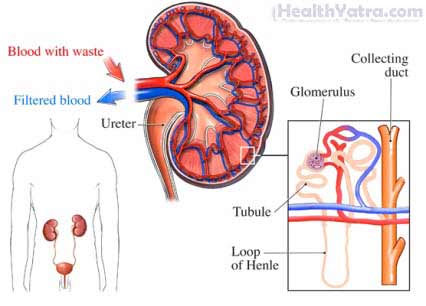Definition
Glomerulonephritis is a kidney condition that involves damage to the glomeruli. Glomeruli are the tiny structures within the kidney that filter blood.
The kidneys are bean-shaped organs located in the back just below the rib cage. Each kidney is about the size of a fist. The two kidneys filter blood, catch needed substances and return them to the circulation, and dispose of wastes in the urine. If the kidneys don’t filter properly, wastes build up in the blood.
There are two types of glomerulonephritis:
- Acute glomerulonephritis begins suddenly.
- Chronic glomerulonephritis develops gradually over several years.
In some cases, glomerulonephritis leads to kidney failure. Kidney failure is a severe kidney disease that must be treated with dialysis or kidney transplant.

Causes
Causes of glomerulonephritis include:
- Streptococcal infection of the throat ( strep throat) or skin ( impetigo)
- Hereditary diseases
- Immune diseases, such as lupus
- Type 1 diabetes and Type 2 diabetes
- High blood pressure
- Vasculitis (inflammation of the blood vessels)
- Viruses ( HIV, hepatitis B virus, and hepatitis C virus)
- Endocarditis (infection of the valves of the heart)
Risk Factors
A risk factor is something that increases your chance of getting a disease or condition.
Risk factors for glomerulonephritis include:
- Family history of glomerulonephritis
- The presence of a known cause of glomerulonephritis
Symptoms
Glomerulonephritis sometimes causes no symptoms and is discovered during a routine urine test. When present, the symptoms of acute and chronic glomerulonephritis differ from one another.
The symptoms of acute glomerulonephritis may include:
- Blood in urine (red, brown, or tea-colored urine)
- Foamy appearance of urine
- Less frequent urination
- Swelling in the morning, especially in the face, feet, hands, and abdomen
Chronic glomerulonephritis can lead to kidney failure. It may cause these symptoms:
- Feeling tired
- Dry, itchy skin
- Nausea
- Vomiting
- Poor appetite
- Muscle cramps at night
- Swelling of the face, feet, hands, or abdomen
Diagnosis
Your doctor will ask about your symptoms and medical history. A physical exam will be done. You may be referred to a doctor (nephrologist) who specializes in kidney disease for further diagnostic testing and treatment .
Tests may include:
- Urinalysis
- Blood tests
- Ultrasound
- Abdominal CT scan
- Kidney biopsy
Treatment
Treatment will depend on the cause of glomerulonephritis. For example, control of blood pressure and blood sugar with medications would be important when treating glomerulonephritis related to hypertension and diabetes. In addition, the following steps may be taken to help kidney function or reduce further damage:
Medications
- Diuretics to reduce fluid retention
- Medications to suppress the immune system such as steroids
Lifestyle Changes
- Restrict salt and water intake.
- Restrict intake of potassium, phosphorous, and magnesium.
- Cut down on protein in the diet.
- Maintain a healthy weight through diet and exercise.
- Take calcium supplements.
Dialysis and Transplant
If the kidneys are unable to remove sufficient waste from the blood, dialysis may be required. Temporary dialysis may be sufficient for acute glomerulonephritis. If it leads to permanent kidney failure, chronic glomerulonephritis will require long-term dialysis or kidney transplant.
Prevention
The following steps may decrease your risk of glomerulonephritis:
- See a doctor promptly if you have a sore throat that might be due to strep.
- To reduce the risk of getting viral infections, including HIV, use safe sex practices and avoid intravenous drug use.
- If you have diabetes or high blood pressure, see your doctor about managing these conditions.
